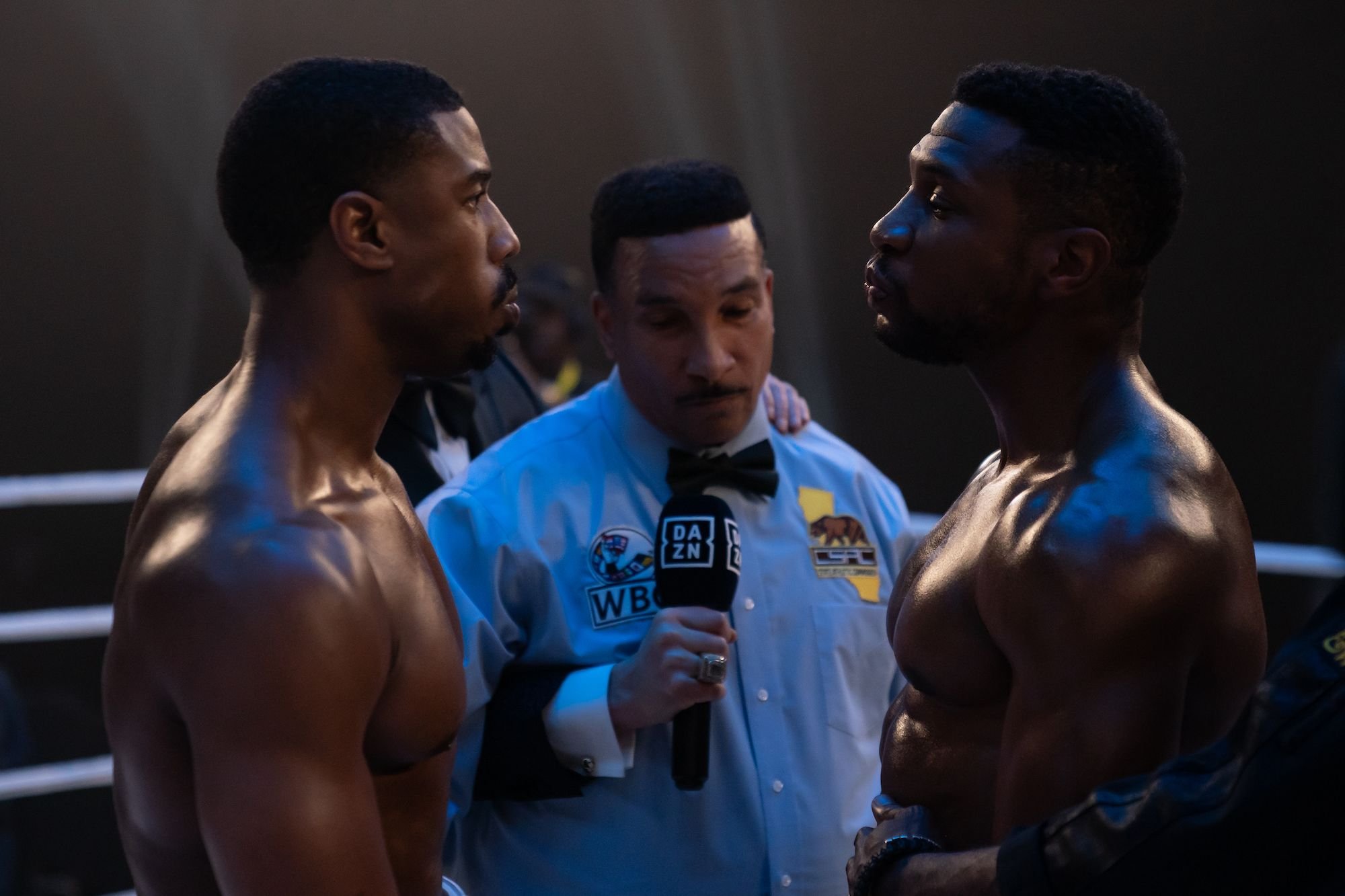Review: Creed III (2023)
Hollywood has never stopped making movies about men, but very few movies today ask what makes a man. The Creed series is an exception. These Rocky spinoffs about Adonis Creed (Michael B. Jordan), the son of Rocky’s rival turned best friend, Apollo Creed, are explicitly interested in masculinity and the makings of a good man. The first film investigates how to be a good son, the second how to be a good father, and the latest film, Creed III, directed by Michael B. Jordan in his directorial debut, is about how to be a good friend. People come to the film to watch the intense boxing scenes, but they stay to see one of the few portraits of positive masculinity that Hollywood has left.
This time round, the retired Adonis has to contend with his old friend, “Diamond” Dame Anderson (Jonathan Majors), who has been released from prison and wants his old buddy to give him a shot at becoming the heavyweight champion of the world. Turns out Dame has a chip on his shoulder that fuels his friendship-turned-rivalry with Adonis. When they were kids living in a group home together, they were both underdogs, but now, Adonis is the retired champ living in a mansion in the Hollywood Hills, living a life of extreme wealth and fame. He needs to only call up Stephen A. Smith if he wants to appear on First Take (as happens in an amusing sequence in the film) and his own opulent mansion is a mausoleum to his triumphs, with giant images of his title fights and a holy reliquary for his championship belts and gear.
Dame, on the other hand, was once a great fighter, but jail derailed his plans, and he blames that misfortune on Adonis. Over the course of the film, we see bits of their shared past and the event that put Dame behind bars and caused an irreparable rift between him and Adonis. But you don’t entirely need the flashbacks to feel the bitterness and discomfort that courses between these former friends. You understand the pain that animates Dame and his resentment at Adonis’s success. When he asks Adonis to set up a title fight for him, Adonis balks at the request, saying that it’s not how it’s done. Dame responds that’s how it was done for Adonis (in the first Creed), but Adonis says that “was different.” But you have to wonder, how so? What makes one man deserving, the other not?
The feeling of being cheated, of two kids from the same group home who ended up on such different paths in life, animates this film. Unlike the Rocky sequels, the Creed films have avoided using caricatures as the antagonists. For instance, in Creed II, the series rehabilitated Ivan Drago and his son, despite Drago having killed Apollo Creed in the ring in Rocky IV. Now, Adonis’s rival is a man who is sympathetic and understandably upset. He’s underhanded and manipulative, which makes him the antagonist, but his feelings of resentment are justified. You almost wonder which fighter you’re supposed to cheer for, which is one of the film’s key strengths.
The other key strength is the performances. I’ve long said that Michael B. Jordan ought to be the biggest star in Hollywood, and Creed III is further proof of what a charismatic and sympathetic performer he is. He’s got the cutting physique, looks good in a suit, and has all the star-wattage you need of an A-lister. But there’s also the bruised ego and insecurity of a child behind his eyes—the watery-eyed need to please and almost insistent desperation that makes him relatable on a human level, which has been the case since his breakout roles on The Wire and Friday Night Lights.
Jonathan Majors is just as good as Jordan. After breaking onto the scene with the well-liked indie, The Last Black Man in San Francisco, back in 2018, Majors has leveraged support roles in films like Spike Lee’s Da 5 Bloods and a starring turn on HBO’s Lovecraft Country (he is the best thing about the series) into several roles as blockbuster villains in 2023. He’s the Big Bad, Kang the Conqueror, for Marvel’s Phase Five, having already appeared in Ant Man and the Wasp: Quantumania this past month, and now he’s the challenger in Creed III. Not bad for 2023 so far. He seems poised for a breakout, if not in the midst of one, and you can understand why with his portrait of Dame.
His hulking physique does much of the heavy lifting in the early scenes here. Majors is bulked up to a ridiculous degree. When he first takes off his robe during a fight, you almost wonder whether he ought to be in a different weight category from the champ—he’s just so massive. He also fights with such desperation and urgency that you believe his hooks can leave an equally hulking man knocked out on the mat.
But it’s the way that Majors seems on the verge of tears the whole time, fighting through his anger and frustration with uneasy smiles, trying to play the grateful old friend, but knowing he can’t entirely mask his bitterness, that makes him so memorable. There’s a conversation midway through where Dame attends a label party held by Adonis’s wife, Bianca (Tessa Thompson). An up-and-coming pop star performs one of Bianca’s songs—Bianca is a musician who is going deaf and so she no longer performs live, which is a key part of the plots of earlier films. After the performance, Dame comes up to her and asks, “How’s it feel watching someone else sing your song?” She says it feels good, but he can see she doesn’t mean it. He knows the pain of watching someone else live the life you wanted, and he knows she feels that too. That kind of performance moment is what makes Creed III better than just a run-of-the-mill boxing sequel. This is important, because the boxing moments aren’t all that special.
While touted in advertisements as being the first boxing film shot in IMAX, there’s not actually much boxing in the film. There’s an opening fight that caps off Adonis’s career before retirement. There’s a mid-film title bout between Dame and the current champion—Adonis does arrange that fight for him after all, but only after Dame manipulates the circumstances in his favour. And there’s the final fight where Adonis returns to the ring to challenge Dame at Dodger Stadium. If someone came to the film expecting wall-to-wall fights, they might be a little surprised at how much of the film is male melodrama, but that surprise would be missing the point of these films. The Creed series is about exploring manhood and how men respond to adversity, evolve, and, yes, fight.
As well, Jordan is a rookie director, so there’s nothing as confident as the one-take match from the first Creed in any of the fights in Creed III. There are a lot of extreme close-ups and the frequent use of slow motion, which has been the standard for boxing films since Raging Bull in 1980. Jordan only grows bold with the filmmaking during the climactic fight at Dodger Stadium, where he visualizes the mental battle between these two men in the ring and has the crowd and the lights fade away, leaving just these two men fighting in a bare ring surrounded by visualizations of their mental prisons. The concept doesn’t entirely work, but I applaud Jordan for that kind of creativity in filming a boxing match, a sport which has been done to death in cinema.
When the film isn’t investigating masculinity or exploring the relationship between Adonis and Dame, the melodrama isn’t as successful either. There are moments with Adonis and Bianca’s deaf daughter, Amara (Mila Davis-Kent), which are mostly noteworthy for their use of sign language. And then there are weepy confessions with Adonis’s mother, played by Phylicia Rashad, which seem perfunctory. The absence of Sylvester Stallone’s Rocky Balboa is also noticeable later in the film, when you’d have to imagine, surely, Adonis would connect with his mentor for his advice on life. But Stallone’s reticence to continue playing the character unless he was also writing and directing at least makes the decision understandable.
The Creed series is at its best when it is zeroing in on what makes a man and investigating that through hardship and battle and tearful confession. Thus, the scenes between Adonis and Dame, whether private conversations or climactic fights, are the highlights in Creed III. In these moments, the film showcases why boxing movies are so cinematic and popular, despite the sport’s decline over recent decades: they explore what makes a man in psychological and physical ways, not neglecting the one side of manhood for the other. As Creed III demonstrates, men fight, men cry, and men grow. What kind of man they become on the other side of those challenges determines whether they’re a man worth emulating and whether they’re a champion.
7 out of 10
Creed III (2023, USA)
Directed by Michael B. Jordan; written by Keenan Coogler and Zach Baylin, based on a story by Ryan Coogler, Keenan Coogler, and Zach Baylin, based on characters created by Sylvester Stallone; starring Michael B. Jordan, Tessa Thompson, Jonathan Majors, Wood Harris, Florian Munteanu, Phylicia Rashad, Mila Davis-Kent.



Danny and Michael Philippou’s follow-up to Talk to Me is a more gruelling, complete film than its predecessor.